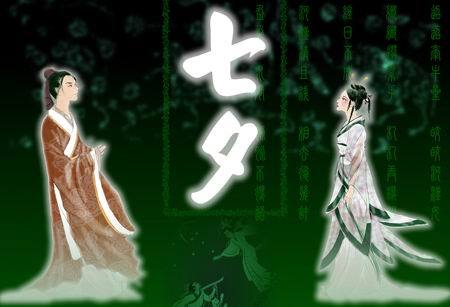Monday is a special day for young Chinese as it is the traditional Chinese festival Qixi which falls on July 7th on the lunar calendar, also known as China's Valentine's Day.
|

The traditional Chinese festival Qixi which falls on July 7th on the lunar calendar, also known as China's Valentine's Day, originated from a beautiful romantic legend in ancient China. (Source: china.org.cn)
|
"I feel sad being single on Qixi. I only have my computer to comfort me," said "coldness1603" in her microblog.
This reveals how desperately lonely some young Chinese feel on China's Valentine's Day.
In the legend of Qixi, a cowherder and a fairy seamstress fell in love but the Goddess of Heaven was against their marriage. Finally, they ascended to heaven as two stars but were separated by the Milky Way.
Magpies sympathized with the lovers and constructed a bridge in the galaxy every year on the night of July 7th, which is what Qixi literally means in Chinese, allowing the couple to reunite.
Moved by this popular legend, Chinese began to celebrate love on the date of the couple's annual reunion since the Han Dynasty (202 B.C. to 220 A.D.).
Now well into the twenty-first century, single Chinese rush to find their love on the Internet on this special day.
One Beijing local surnamed Pan, 28, wrote in his microblog: "Though no car, no housing despite a big face, I want to go with you hand-in-hand, if you are the one."
This piece of writing reveals the reality facing many young Chinese. With limited free time and a small social circle, some hard working young Chinese have no time to fall in love.
"Office romances are banned in my company, and I have no time outside work to find love," said Chen Shan, a 30-year old woman in a shipping company.
To solve this problem, some match-making websites such as Baihe.com have launched a variety of programs, for example, blind date fairs, to cash in on the demand.
On social networking websites, discussions about how to propose also attract public attention.
Touching the hearts of thousands of Internet users, a popular picture on renren.com, kaixin.com and sinamicroblog shows a new way of expressing love.
According to the picture, a talented Internet user collects dozens of Chinese love songs including Dear (the name of the song), Just want, Love, Forever, etc. Then he or she plays them in an audio player in the order like this: "Dear", "Actually","(I) Just want (to)", "Love you", "forever".
"I will say yes, if someone proposes like this," commented "Lengtu," an Internet user who couldn't wait to listen to each song.
Chinese TV too has aired many programs about the romantic day. On Monday's evening, special shows were launched on many provincial channels to mark the festival.
A live show Tonight, let's celebrate love on Hunan provincial channel invited more than 20 couples as well as pop stars to tell their love stories and share their understanding of love.
Some of them were expected to propose to their lovers on the live shows.
In cinemas, a film called Love in Disguise starring Lee-Hom Wang, was released just before the festival.
Some Chinese celebrated Qixi by going to see plays.
Mudanting or the Pavilion of Peony, a Kunqu play depicting two young lovers fighting for their romance in ancient China was performed Monday evening in Nanjing, capital of eastern China's Jiangsu province.
Zhang Jiqing, a 72-year old Kunqu actress told Xinhua that the show was held outdoors within the city's scenic garden. With traditional singing and modern stage design, the audience could witness a beautiful love story under the stars, weather permitting.
"I will take my girlfriend to watch the show tonight as a special gift for Qixi festival," said Chen Chen, a 25-year old local man in Nanjing.
"With the great atmosphere produced by the play, I believe she will be moved by my love and accept my proposal of marriage," said he.
(Xinhua News Agency August 17, 2010)